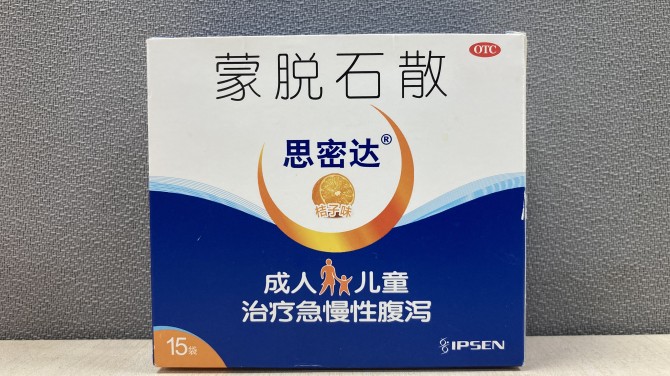
The People's Government of Foshan Municipality
Source:newsgd.com 2023-01-19
About medication preparation for COVID-19, do I need an oxygen generator, human immunoglobulin, and montmorillonite powder at home?
On January 13, the Health Commission of Guangdong Province organized pharmaceutical experts to answer questions that residents are concerned about.
Experts reminded us that preparing a moderate amount of medicine during the epidemic is encouraged, but storing large amounts of drugs and medical devices is not necessary.

Montmorillonite powder. (Photo: GDToday)
Q: Do we need to prepare an oxygen concentrator at home for “silent hypoxia”?
The oxygen concentrator is mainly used by patients with chronic respiratory diseases. Generally speaking, families without such patients do not require home oxygenators.
Whether patients infected with COVID-19 need oxygen inhalation depends on their conditions. Patients with mild symptoms do not require oxygen inhalation, whereas moderate patients may do so as needed. Severe and critically-ill cases are in need of supplemental oxygen.
COVID-19 infected patients are urged to seek prompt medical attention and call 120 when experiencing significant chest tightness, shortness of breath, dyspnea or other symptoms of hypoxemia, with oxygen saturation below 93% as determined by fingertip pulse oximeters.
Oxygen therapy for patients infected with COVID-19 is an adjuvant therapy that must be used in conjunction with other treatments and should be administered under the guidance of medical professionals. Oxygen toxicity can result from excessive oxygen concentrations or extensive exposure time.
Q: Is intravenous immunoglobulin (IVIG) suitable for the treatment of people infected with COVID-19?
Clinical trial research has been carried out and experts have attempted to use human immunoglobulin to treat patients infected with COVID-19. Unfortunately, there is not enough high-quality and evidence-based data to support its efficacy.
An article concerning a phase 3 clinical trial published in The Lancet showed that “IVIG did not significantly reduce ventilator-free days at day 28 in patients admitted to the intensive care unit for COVID-19-associated moderate-to-severe ARDS” and that treatment was associated with a low rate of acute renal failure and thromboembolism.
Currently, neither China’s nor other countries’ guidelines for the treatment of COVID-19 infections recommend treatment with IVIG.
Q: Are there any side effects associated with the use of human immunoglobulin?
As a blood product, IVIG is subject to strict restrictions and regulations when it is used. Various side effects may occur during infusion, such as allergy, headache, fever, malaise, and nausea.
Therefore, the use of human immunoglobulin in patients infected with COIVD-19 necessitates medical evaluation of the patients’ symptoms and complications. Common people should not rush to buy the products out of hoarding medicine.
Immunoglobulin comes from the plasma of healthy blood donors. Once it is out of stock, it is challenging to restore the supply in the immediate term due to factors including the lack of raw materials. Please reserve medicines for patients in need.
Q: Does Coenzyme Q10 (CoQ10) help to prevent myocarditis?
The claim that CoQ10 helps prevent heart disease is not backed up by any clear evidence. It's important to get enough rest and stay away from excessive exercise to prevent viral myocarditis. Older people should follow a low salt and fat diet and receive treatment if they have underlying conditions.
CoQ10 is a vitamin-like substance that is naturally present in the human body, with the largest concentrations in the heart, liver, and kidneys. It is mainly involved in cellular metabolism and serves as an antioxidant.
In China, CoQ10 is currently approved for use in adjuvant treatments for viral myocarditis and chronic heart failure.
Q: What is the best approach for CoQ10 supplementation? Is it necessary to take relevant medicine?
CoQ10 can be synthesized in the human body and can also be acquired from food. It is high in meat and whole grains, such as animal offal, pork, chicken, fish, soybeans, nuts, and vegetable oils. If one has a balanced diet, the individual will usually not be deficient in CoQ10.
People may take CoQ10 medication if they fail to absorb it through diet. Bear in mind that patients should consult their pharmacists or doctors before taking CoQ10 medication if they are using the anticoagulant warfarin at the same time.
Q: What are the tips for using montmorillonite powder?
In addition to not being the ideal option for treating acute diarrhea, using too much montmorillonite powder can result in constipation or gastric stones.
When acute diarrhea comes, preventing dehydration and electrolyte disorders by consuming sports drinks or oral rehydration salts (ORS) is the main treatment.
Montmorillonite powder functions as an adsorbent that covers and protects the mucous membrane of the digestive tract after oral administration.
However, it is this absorbent function that requires patients to take montmorillonite powder at least 1-2 hours after taking other drugs to reduce the negative effect on absorption of drugs.
Montmorillonite powder does help to lessen the frequency and severity of diarrhea by immobilizing and inhibiting toxins, bacteria and virus in the gastrointestinal tract.
But there is no need to worry if it is temporarily unavailable. When diarrhea comes, adults can turn to alternatives such as loperamide for help, and children can take probiotics instead.
Copyright © The People's Government of Foshan Municipality All rights reserved.Government hotline:0757-12345
网站标识码:4406000048